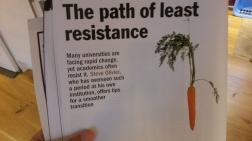This week my job share in the role of Dean for Diversity and Inclusion, Simon Chandler-Wilde, and I have been doing the first of several discussion sessions for staff at University of Reading. We are presenting our initial plans for making our University more diverse and inclusive and asking for feedback on proposed actions to get towards the Diversity and Inclusion targets recently agreed by our University Executive Board (such as increase in women in professorial roles and better representation of women and BAME staff on strategic decision making committees).
One question we got asked was… “you obviously chose to apply for these roles, so what got you into it?”. Here is the answer I gave, the first parts of which I have said before, but the final part I only realised when answering the question!
One of my core values is enabling people to reach their full potential. I have always mentored formally and informally and I love teaching. As a Head of Department I was responsible for career and personal development of academic and research staff. The most joyful parts of my job have been hearing that people have got the degree, new job, promotion or publication that they really deserved. I have literally jumped up and down in my office on several occasions. So a role in promoting and driving diversity and inclusion is very closely aligned to my core values.
I also have a sort of history of challenging gender stereotypes albeit in a parochial way:
When I was 7 I asked my Dad why only boys were allowed to sing in the church choir (he was in it himself). He told me to ask the vicar, who didn’t have a defensible answer (arguments are sometimes made about the different tonal quality of boys voices compared to girls but this was not a high cathedral choir). So two of us joined and pretty soon the number of junior choristers soared now that they could access the talent of the girls.
When I was 12 my male physics teacher told me that girls didn’t do physics. When people tell me I can’t do something, that tends to motivate me to do exactly that (within the confines of socially acceptable behaviour and without breaking laws obviously). Later on, when I told the careers advisor that I wanted to do physics at university, he said “well I suppose you could be a teacher”. I AM a teacher of sorts but I don’t think this is what he had in mind!
My first (and possibly only) bit of direct campaigning so far concerned the fact that at the boys school in our town they were allowed to study for 10 GCSEs whilst us girls were only allowed to do 8 subjects. To their credit, the school arranged for our Head mistress to teach a class of 6 of us French every morning before school so that we could do 9 subjects, which was a big commitment, but I was never given a satisfactory answer as to why we couldn’t do the same number in the first place.
I have told those stories before. But yesterday it also struck me that there has been another driver in recent years. Having children exposes you to all sorts of gender stereotypes about working parents, mothers versus fathers etc. However, it’s when my children started school, in a primary school that serves a catchment area with great diversity in terms of race, ethnicity, socio-economic background and relationship with education, that I really became aware of some of my own biases. Not only that, but I realised that many of my children’s friends will not have the opportunities that they should have because of various biases, be that relating to gender, race or socio-economic background. Of course at University we see the product of these biases in that students from different backgrounds face additional challenges in applying to, being accepted at and progressing through their courses.
So I took this job in the hope that I can do something, in a small way, to ensure that all my children’s classmates get the opportunities they deserve. The University is my home environment so I start here, but I am now starting to be able to use the learning from this role to challenge my own biases and the behaviour in the School too.




























